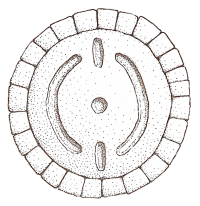Magic Rules
The Schools of Magic
Those who study magic agree on very little, but most scholars accept ten Major Schools of magic:
Abjuration spells protect and ward, but such protections can also be wielded as weapons to unravel magic and banish daemons.
Alteration spells alter the physical qualities of objects. A difficult and limited school, but still very useful. It is generally believed to be impossible to change one material into another; most alteration spells only momentarily alter an object's properties, without effecting its essence.
Apportation spells move things from one place to another instantly by linking distant locations. Such magic is difficult and dangerous, and some argue it should hardly qualify as a major school.
Divination spells can be used to see or hear at a distance or even glimpse the future. The threads of magic entangle all things, so that knowledge of one part can grant knowledge of another.
Conjuration spells create something from nothing. Students of this school speak often of the Order of Purity, a hierarchy of all materials. Such students, along with alchemists, hold that lead is unripe iron, and iron unripe silver, and so on. This order is most important in alchemy, which often sets as its goal the ripening of gold into still more perfect material, from which it can be used to ripen other metals to purer states. Even the most complex conjurations are produced from some combination of the four elements; because conjuration cannot create souls, even a wizard of immense talent could only ever make empty bodies with this school.
Enchantment spells manipulate the mind, causing terror as easily as they lull others into friendship.
Evocation spells siphon raw energy from the elemental chaos, and release it as a deadly weapon. Such magic can create blasts of fire and ice, or, with great care, draw on raw force to manipulate objects from afar. These evocations of force are more difficult to sift out from the other elements, such that many a novice or distracted mage has set fire to an object they are trying to levitate.
Illusion spells alter how things are perceived, fooling the senses. An illusion spell could make a pebble into a gold nugget or a wizard into a patch of empty air. Some have always argued that this school falls under the purview of Enchantment; others claim it is a sort of Alteration.
Necromancy spells deal with the soul. The cynic-mages used the art to speak with the spirits of the dead, hence the name. This much-feared school also contains the power to heal wounds, snuff out life, and animate the dead with a hideous mockery of life.
Summoning spells conjure spirits from the chaos. Having brought forth an elemental, or worse, a Daemon, a wise caster binds the subject with abjuration.

No Comments